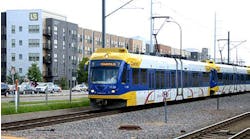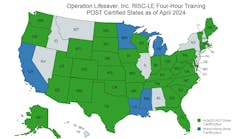April 24--DURHAM -- Prodded by a Charlotte Republican, the N.C. House appears likely to try to make it harder for the state and the Triangle to secure financing for any sort of passenger-rail project.
A draft budget bill would require the N.C. Department of Transportation to seek legislative permission before accepting any federal grant that would oblige it to spend more than $5 million in state matching funds or annual operating costs for any rail project.
It also would reverse the General Assembly's decision a year ago to instruct DOT to give "preferential consideration" to rail-based transit projects, like the one officials in the Triangle are planning, when it's awarding funds from one key pot of money.
The anti-rail measures are moving ahead under the eye and urging of Rep. Ric Killian, R-Mecklenburg, who argues rail projects are mostly a waste of money for a state that should concentrate its resources on roadwork.
"Once the road system is completed, then we can have the discussion about whether to have rail or high-speed rail ... as an amenity," he told members of the House Transportation Committee last week.
The committee was debating a separate bill, scheduled to reach the floor of the House on Tuesday, that parallels the legislative-approval provisions in the draft budget.
Killian is a rank-and-file member of the Transportation Committee, but he's co-chairman of a smaller Appropriations Committee panel that actually writes DOT's annual budget. There, he had no trouble turning aside opposition from rail supporters. Rural legislators hold most of the seats on the appropriations panel.
He got more of a fight in the larger Transportation Committee.
In that venue, rail supporters were able to get the legislative-approval requirement deleted from the separate bill. Two members of Durham's General Assembly delegation, Reps. Larry Hall, D-Durham, and Winkie Wilkins, D-Person, joined that effort.
But both sides acknowledged that the fight would likely continue on the House floor, especially if Killian amended the bill to require special sessions of the General Assembly to sign off on grant awards.
He's already tipped his hand about how he'll do that, as the draft budget includes language that would allow DOT to accept a grant if legislators fail to act on it within 60 days.
Rail supporters derided the Charlotte legislator's roads-first-and-almost-only approach. They pointed to the likelihood of ever-higher fuel prices as the main reason to get busy expanding the state's transportation options.
"What are we going to do next, after we build all the roads, all the loops and all the things we do for cars, and the next thing we know we've got gas at $6 a gallon?" asked Rep. Marcus Brandon, D-Guilford.
No answer to that ever came during the Transportation Committee debate.
It was clear to legislators, though, that the approval provision is supposed to erect a significant bureaucratic roadblock to rail projects, save those funded by the $545 million in federal economic-stimulus aid DOT received last year to upgrade the railroad that links Raleigh, Durham, Greensboro and Charlotte. Those are far enough along in the pipeline that they're beyond legislative intervention, Killian said.
Killian represents a southeast Mecklenburg County district whose residents in 2007 voted -- by a margin of 66 percent to 34 percent -- to retain the local-option tax that has financed Charlotte's rail transit project.
Countywide, 70 percent of Mecklenburg's voters favored keeping the levy, despite calls by conservatives for its repeal.
Killian himself has secured three terms in the House without ever having to subject his opinions to voter scrutiny. Local GOP leaders added him to the ballot, for an uncontested seat, late in the 2006 campaign to replace an incumbent who'd dropped out. And Democrats didn't bother running anyone against him in 2008 or 2010.
The former chairman of the Mecklenburg County Democratic Party, Michael Evans, said most legislative districts in the Charlotte area heavily favor one party or another.
Because promised aid from the state party appeared unlikely to materialize, "we didn't spend a lot of time seeking out candidates to fall on a sword" in the GOP-leaning districts, he said.
___
To see more of The Herald-Sun, or to subscribe to the newspaper, go to http://www.heraldsun.com.
Copyright (c) 2011, The Herald-Sun, Durham, N.C.
Distributed by McClatchy-Tribune Information Services.
For more information about the content services offered by McClatchy-Tribune Information Services (MCT), visit www.mctinfoservices.com, e-mail [email protected], or call 866-280-5210 (outside the United States, call +1 312-222-4544)


